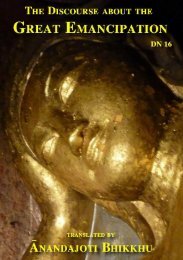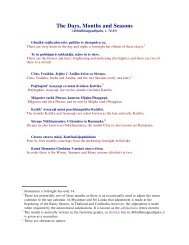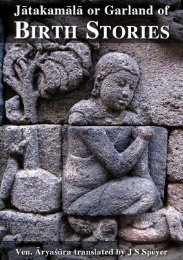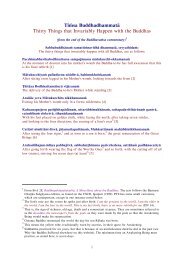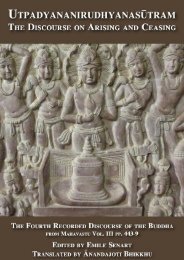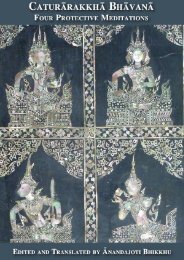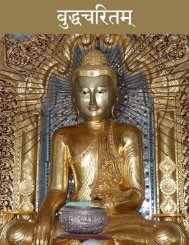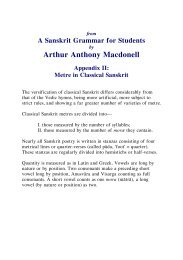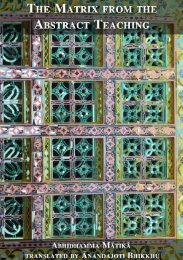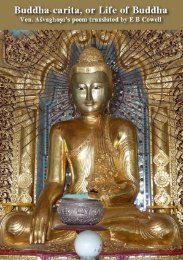BhikkhunÄ«saá¹yutta Thematic Discourses about Nuns - Ancient ...
BhikkhunÄ«saá¹yutta Thematic Discourses about Nuns - Ancient ...
BhikkhunÄ«saá¹yutta Thematic Discourses about Nuns - Ancient ...
You also want an ePaper? Increase the reach of your titles
YUMPU automatically turns print PDFs into web optimized ePapers that Google loves.
The <strong>Thematic</strong> <strong>Discourses</strong> <strong>about</strong> <strong>Nuns</strong> - 10<br />
Atha kho Kisāgotamī bhikkhunī, pubbaṇhasamayaṁ nivāsetvā,<br />
Then the nun Kisāgotamī, 13 having dressed in the morning time,<br />
13 Comm: Kisāgotamī ti, appamaṁsalohitatāya kisā, Gotamī ti panassā nāmaṁ. Pubbe kira<br />
Sāvatthiyaṁ ekasmiṁ kule asītikoṭidhanaṁ sabbaṁ aṅgārā va jātaṁ. Kuṭumbiko aṅgārajātāni<br />
anīharitvā: “Avassaṁ koci puññavā bhavissati, tassa puññena puna pākatikaṁ bhavissatī.” ti<br />
Suvaṇṇahiraññassa cāṭiyo pūretvā, āpaṇe ṭhapetvā samīpe nisīdi. Athekā duggatakulassa<br />
dhītā: “Aḍḍhamāsakaṁ gahetvā, dārusākaṁ āharissāmī,” ti vīthiṁ gatā taṁ disvā kuṭumbikaṁ<br />
āha: “Āpaṇe tāva dhanaṁ ettakaṁ, gehe kittakaṁ bhavissatī?” ti “Kiṁ disvā amma evaṁ<br />
kathesī?” ti “Imaṁ hiraññasuvaṇṇan!”-ti So: “Puññavatī esā bhavissatī.” ti Tassā<br />
vasanaṭṭhānaṁ pucchitvā, āpaṇe bhaṇḍaṁ paṭisāmetvā, tassā mātāpitaro upasaṅkamitvā evamāha:<br />
“Amhākaṁ gehe vayappatto dārako atthi, tassetaṁ dārikaṁ dethā” ti. “Kiṁ Sāmi<br />
duggatehi saddhiṁ keḷiṁ karosī ti?” “Mittasanthavo nāma duggatehi pi saddhiṁ hoti, detha<br />
naṁ, Kuṭumbasāminī bhavissatī,” ti naṁ gahetvā gharaṁ ānesi. Sā saṁvāsam-anvāya puttaṁ<br />
vijātā. Putto padasā āhiṇḍanakāle kālam-akāsi. Sā duggatakule uppajjitvā, mahākulaṁ gantvā<br />
pi: “Puttavināsaṁ pattāmhī.” ti Uppannabalavasokā, puttassa sarīrakiccaṁ vāretvā, taṁ<br />
matakaḷevaraṁ ādāya nagare vippalapantī carati. Ekadivasaṁ mahatiyā Buddhavīthiyā<br />
Dasabalassa santikaṁ gantvā: “Puttassa me arogabhāvatthāya bhesajjaṁ detha Bhagavā” ti<br />
āha. “Gaccha Sāvatthiṁ āhiṇḍitvā, yasmiṁ gehe matapubbo natthi, tato siddhatthakaṁ āhara,<br />
puttassa te bhesajjaṁ bhavissatī.” ti Sā nagaraṁ pavisitvā, dhuragehato paṭṭhāya, Bhagavatā<br />
vuttanayena gantvā, siddhatthakaṁ yācantī ghare ghare, “Kuto tvaṁ evarūpaṁ gharaṁ<br />
passissasī?” ti vuttā. Katipayāni gehāni āhiṇḍitvā: “Sabbesam-pi kirāyaṁ dhammatā, na<br />
mayhaṁ puttassevā.” ti Sālāyaṁ chavaṁ chaḍḍetvā pabbajjaṁ yāci. Satthā: “imaṁ pabbājetū”<br />
ti bhikkhuni-upassayaṁ pesesi. Sā khuragge yeva Arahattaṁ pāpuṇi. Imaṁ Theriṁ sandhāya:<br />
“Atha kho Kisāgotamī...” ti vuttaṁ; Kisāgotamī, because of having little flesh and blood she<br />
was called thin (Kisā), Gotamī is her (clan) name. In the past it seems in a certain family in<br />
Sāvatthī having 80,000 in wealth it all turned to ashes. The head of the family, having not<br />
thrown away those ashes (thought): “Inevitably there will be some merit (remaining), and it<br />
will be possible to restore (the wealth) through that merit.” Having filled golden coloured<br />
vessels (with the ashes), and set them up in the market, he sat down close by. Then a certain<br />
poor family's daughter (thinking): “Having got a halfpenny, I can carry away some wood and<br />
vegetables,” while going along the road said this to the head of the family: “You have so much<br />
wealth in the market, how much will there be in the home?” “Having seen what, dear girl, do<br />
you speak thus?” “This is pure gold!” He (thought): “She must be endowed with merit.”<br />
Having asked the place she was living, and set in order his goods at the market, he<br />
approached her mother and father and said this: “In our house there is a young boy growing<br />
up, give her to this boy.” “Why, Master, do you play with poor people (like us)?” “(I am)<br />
known as an intimate friend to the poor, give her, and she will be the wife of the head of the<br />
family,” and having taken her he led her to the house. After intercourse she became one who<br />
had borne a son. The son, at one time when he was wandering around on foot, died. Having<br />
been born in a poor family, she went to the great family (and said): “My son has come to<br />
destruction.” Being overcome by grief, she put aside the duties to her son's body, and took his<br />
dead body and roamed <strong>about</strong> wailing in the city. One day, having drawn close to the Buddha,<br />
the One of Ten Powers, on the highway: She said: “My son has fallen ill, give some medicine,<br />
Gracious One.” “Go, and having wandered in Sāvatthī, from a house where there has formerly<br />
been no deaths, bring a mustard seed, and that will be medicine for your son.” She entered the<br />
city, and beginning from the nearest house, she went in accordance with the Gracious One’s<br />
words, begging for mustard seed from house to house, “Where will you find such a house?”<br />
they said. Having wandered to several homes (she understood): “It seems to be a general rule<br />
everywhere (that people die), not only my son.” Having left the corpse in a shed she asked for<br />
the going-forth. The Teacher sent her to the nunnery and said: “Give her the going-forth.” In<br />
the razor hall itself (while they were still giving her the going-forth) she attained Worthiness.<br />
In connection with this Elder: “Then Kisāgotamī...” was said.



